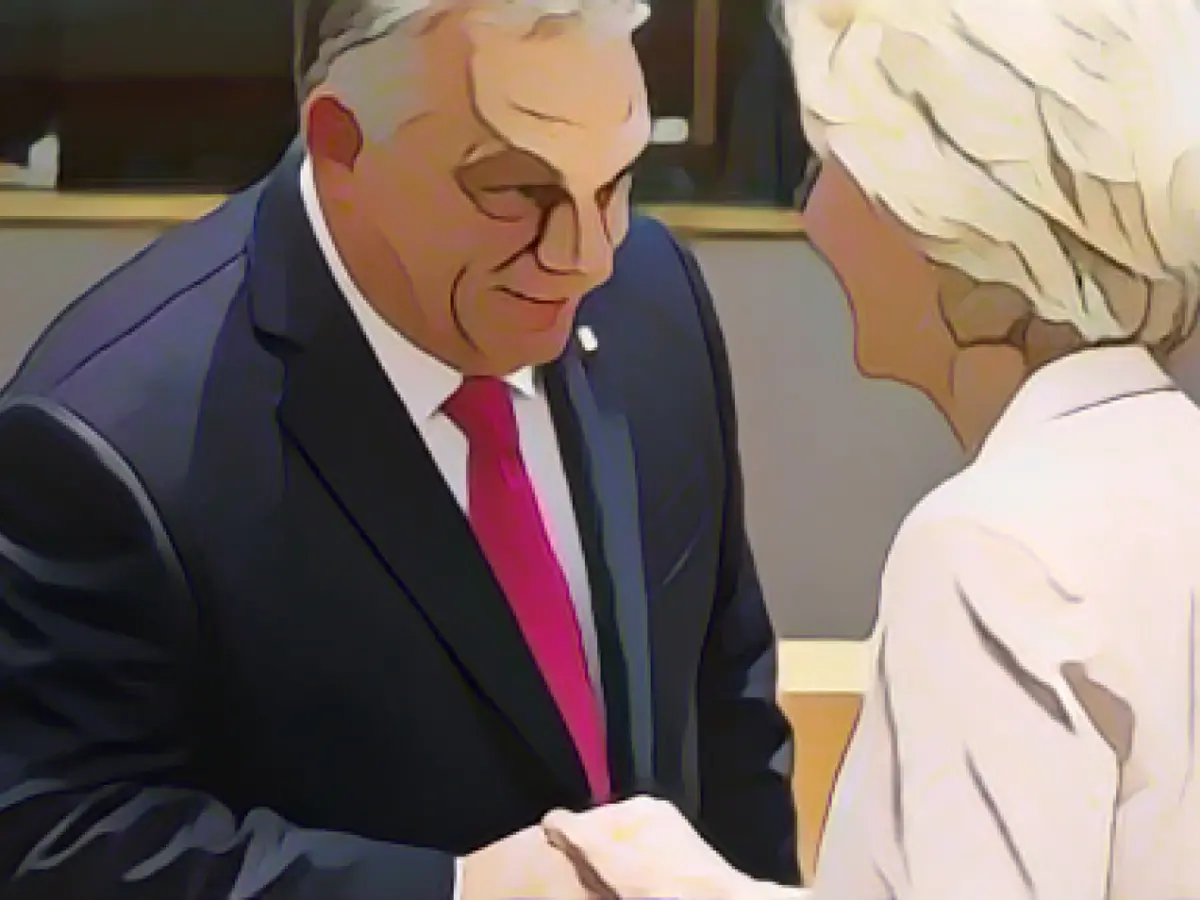Criticizing the EU's Decision: 10.2 Billion Euros for Hungary
After fierce criticism from various quarters, the EU Commission has decided to release a substantial 10.2 billion euros for Hungary, potentially clearing the way for reimbursements. This decision has not gone down well with many, particularly in the European Parliament.
A "Catastrophic Signal"
Green Party MEP, Daniel Freund, has characterized this move as a "catastrophic signal." He accused Commission President, Ursula von der Leyen, of paying "the biggest bribe in EU history" to Hungarian Prime Minister, Viktor Orbán, a known friend of Putin.
Sacrificing Democracy
FDP MEP, Moritz Körner, was even more critical, arguing that von der Leyen was sacrificing the very tenets of democracy in Hungary, all in the name of saving democracy in Ukraine. Körner pointed out that Hungary had only made reforms on paper and that these were not sufficient for EU releases.
Conflicted Timing
CSU politician, Monika Hohlmeier, who chairs the Budgetary Control Committee in the European Parliament, weighed in on the timing of the release of funds, suggesting that these funds would likely end up in the hands of Orban's allies and loyal oligarchs.
Unanimous Criticism
The four large political groups in the EU Parliament had attempted in vain to dissuade von der Leyen from her decision. However, von der Leyen remained steadfast, prioritizing the planned 50 billion euros in aid for Ukraine. Despite Luxembourg's warning that a perceived "deal" would not strengthen citizens' trust in Europe, German government circles expressed confidence in von der Leyen.
Rule of Law Proceedings
Last year, the EU initiated rule of law proceedings against Hungary due to suspicions of misappropriation of European budget funds and held further funds in reserve. Budapest continues to clash with Brussels over violations of fundamental rights, including the rights of asylum seekers, sexual minorities, and academics.
Chancellor Scholz's Position
Chancellor Olaf Scholz (SPD) has acknowledged Hungary's resistance at the EU summit, aiming to make a strong case for both aid for Ukraine and accession negotiations with Kiev.
Enrichment Data:
Background
- Conditionality Mechanism: The EU Commission has been involved in a dialogue with Hungary regarding the release of EU funds. Hungary has been required to implement several reforms related to the rule of law and institutional changes to ensure compliance with EU values and protect the financial interests of the Union.
- Reforms and Conditions: The Commission has approved a plan for the recovery and resilience of Hungary, which includes a total envelope of 10.4 million euros. However, around EUR 20 billion remain frozen due to concerns over LGBTQI rights, academic freedom, and asylum rights. These funds are blocked under the conditionality mechanism and will remain suspended until Hungary fulfills all necessary conditions.
- Pre-financing: Hungary has received pre-financing under the REPower program, which is not subject to any conditions. This pre-financing is part of the rules agreed upon by all Member States and is intended to ensure stability and substantial financing for Ukraine over the next four years.
Reaction
- European Parliament Criticism:
- EPP Group: The European People's Party (EPP) has expressed concerns about the decision, emphasizing the need for further clarification on the reasoning behind the Commission's decision. They have initiated a letter to ask for more information from Commissioners Schmit, Reynders, and Commissioner Hahn.
- Renew Group: The Renew Group has criticized the practice of giving in to blackmail by Hungarian Prime Minister Viktor Orbán, particularly in the context of the previous European Council in December. They argue that this approach should stop and propose alternative solutions such as a face-saving emergency clause or enhanced cooperation under the control of the European Parliament.
- Article 7 Case:
- The EPP has initiated an Article 7 case against Hungary, which is a mechanism to address breaches of EU values. They urge the Council to answer their request on Article 7, as the leaders have not yet discussed the Hungarian case on substance.
- Ukraine Support:
- The discussion also involves how to support Ukraine, including how to pay teachers, nurses, doctors, and soldiers. The European Parliament emphasizes the need for certainty on long-term financing of the European Union and criticizes the lack of clarity on the Commission's decision regarding Hungary's funds.
In conclusion, the EU Commission's decision to release 10.2 billion euros to Hungary has sparked significant criticism from the European Parliament, particularly regarding the lack of clarity on the conditions and the potential for future blackmail by Hungarian Prime Minister Viktor Orbán. The Parliament is pushing for more transparency and adherence to EU values, while also emphasizing the need for stable and substantial financing for Ukraine.







